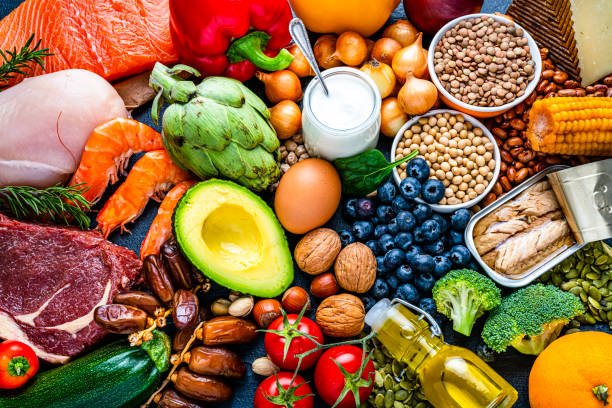Exploring the Healthiest Diet Options: A Comprehensive Guide

Maintaining a healthy diet is key to leading a vibrant and fulfilling life. It’s not just about eating to fill our stomachs. It is all about fueling our bodies with the nutrients we need. In New Zealand, we are blessed with an abundance of fresh products and diverse culinary traditions. Opportunities for nourishing ourselves are endless.
This guide from Black Bean Foods NZ delves us into the realm of healthy eating and the best gluten-free diet options available in NZ to help you make informed choices for diet for a healthy body.
Understanding the Basics
What exactly is a Healthy diet nz? A healthy diet provides essential nutrients that our bodies need to function optimally. A healthy diet includes a balanced intake of carbohydrates, proteins, fats, vitamins, and minerals. It’s not just about what we eat, but also how much and how often. By including a wide range of gluten-free food diets in our meals, we can ensure that we’re getting all the nutrients we need.
One common misconception is that healthy eating has to be expensive or complicated. In reality, there are plenty of affordable and simple ways to eat healthily. Another myth is that certain foods are “good” or “bad.” In truth, it’s the overall pattern of our diet that matters most, rather than individual foods.
Balance is about consuming the right proportions of different food groups, such as fruits, vegetables, grains, protein sources, and dairy or alternatives. Moderation means enjoying all foods in moderation, including those that may be less nutritious. And variety ensures that we don’t get stuck in a rut, both in terms of taste and nutrition.
Traditional New Zealand Foods
Staples like kumara, or sweet potato, are delicious and also packed with essential nutrients like vitamins A and C, potassium, and fiber. Seafood provides a rich source of protein, omega-3 fatty acids, and various vitamins and minerals.
kumara and seafood, indigenous greens such as puha, watercress, and kawakawa are valued for their nutritional properties. These greens are rich in vitamins, minerals, and antioxidants, contributing to heart healthy diet for overall health and well-being.
Popular Diet Trends
Various diet trends have gained popularity in New Zealand. Each claiming to offer a unique healthy and balanced diet. From the Paleo diet to the Keto diet these diets offer certain benefits. They come with potential drawbacks and considerations. For example, the Paleo diet restricts grains and dairy, which could lead to deficiencies in certain nutrients.
A Keto diet can be challenging to sustain long-term and may not be suitable for everyone. Consulting with a healthcare professional or registered dietitian can provide personalized guidance and support to help you make the best choices for your well-being.
The Mediterranean Diet
Incorporating Mediterranean-style eating into daily life in New Zealand is both achievable and enjoyable. Start by incorporating more olive oil into your cooking, swapping out refined grains for whole grains like brown rice and quinoa, and increasing your intake of fruits and vegetables. The mediterranean diet has gained popularity for its numerous health benefits and delicious culinary traditions. Originating from the Mediterranean region, this diet emphasises fresh, whole foods that are abundant in nutrients and flavor. Key components of the Mediterranean diet include olive oil, which is rich in heart-healthy monounsaturated fats, as well as whole grains, fish, fruits, vegetables, nuts, and seeds.
Additionally, enjoy fish regularly, aiming for at least two servings per week, and incorporate nuts and seeds as nutritious snacks or toppings for salads and yogurt.
Importance of Local and Seasonal Foods
Eating local and seasonal foods offers several benefits. Choose foods that are grown or produced locally, we reduce the carbon footprint associated with transportation and storage, thereby decreasing greenhouse gas emissions and supporting a more sustainable food system.
Additionally, local and seasonal foods are often fresher and more flavorful, as they are harvested at peak ripeness and consumed shortly thereafter, retaining their nutritional value and taste.
Supporting local farmers and producers can bolster the local economy and strengthen community connections. Local food systems create jobs, preserve farmland, and foster a sense of pride and belonging within our communities. To find local farmers’ markets and producers in your area, check online directories, visit community notice boards, or ask at your local grocery store.
Navigating Food Labels
Interpreting food labels can be a daunting task but understanding and focusing key elements can make informed choices about the foods you eat. Pay attention to the ingredients list when reading food labels. Look for whole, minimally processed foods and avoid artificial additives and preservatives. Check the nutritional information panel for important details such as serving size, calories, macronutrients (protein, carbohydrates, fats), and micronutrients (vitamins, minerals).
Look for certifications such as organic, fair trade and non-GMO which indicate that the product meets certain standards of quality and sustainability.
Practical Tips for Healthy Eating
Incorporating healthier food choices into your everyday life doesn’t have to be complicated. Start by planning your meals ahead of time to ensure you have nutritious options readily available.
Try to Focus on filling your plate with a variety of colorful fruits and vegetables, whole grains, lean proteins, and healthy fats. Practice portion control by paying attention to serving sizes and listening to your body’s hunger and fullness cues.
How to eat a healthy diet? Try incorporating easy recipe ideas using local and seasonal ingredients to make healthy eating even more accessible. For example, whip up a colorful salad using fresh greens, vegetables, and herbs from your local farmers’ market.
Prepare a hearty soup or stew using seasonal produce and protein-rich legumes. Our Organic Food Store Black Bean Foods offers different flavours, cuisines and the best healthy diet to keep meals exciting and enjoyable.
Conclusions
In conclusion, prioritising healthy eating is essential for maintaining overall health. By using a diet for healthy body rich in whole and minimally processed foods. We can nourish our bodies and support a more sustainable food system.
Remember to read food labels carefully, plan your meals ahead of time, and practise mindful eating to make informed choices. Let’s prioritise our health and make conscious decisions that benefit ourselves, our communities, and the planet. We invite you to share your thoughts, experiences, and feedback as we start a journey towards healthier living together.


